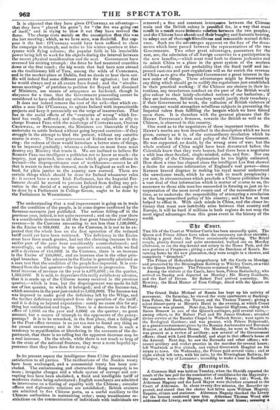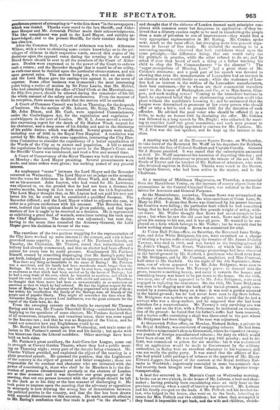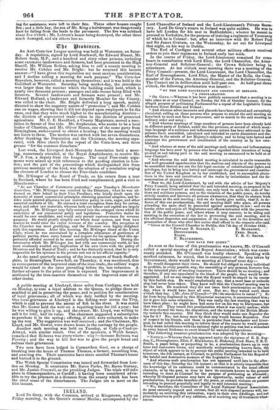She 1131ttropolfs.
A Common Hall was held on Tuesday, when the Sheriffs reported the result of the late poll for the nomination of candidates for the Mayoralty : the numbers were—for Magnay, 893; Lord Mayor, 149; Wood, 82. Alderman Magnay and the Lord Mayor were therefore returned to the Court of Aldermen. In about twenty-five minutes, the Recorder ap- peared, and stated that the choice bad fallen upon William Magnay, Esquire, citizen and stationer. Alderman Magnay thanked the Livery for the honour conferred upon him. Alderman Thomas Wood also addressed the Livery, amid mingled applause and hisses; miming a gentleman present of attempting to " write him down "in the newspapers ; which was denied. Thanks were voted to the late Sheriffs, and Alder- man Hooper and Mr. Jeremiah Pilcher made their acknowledgments. The like compliment was paid to the Lord Mayor, and suitably ac- knowledged; and to the present Sheriffs, for their conduct during the late election.
After the Common Hall, a Court of Aldermen was held. Alderman Wilson, with a view to obtaining some certain knowledge as to the pri- vileges of citizens in their respective wards, moved that copies of the decisions upon the opposed votes daring the scrutiny in the ward of Bread Street should be sent to all the members of the Court of Alder- men. Doubts were expressed as to the power of the Court to enforce such a return ; and the Recorder thought that it would be of no utility, as each case must be decided upon the particular circumstances, and not upon general rules. The motion being put, five voted on each side; and the Lord Mayor gave his casting-vote against it, on the score of expense. Some other business was transacted ; the most interesting point being a notice of motion by Sir Peter Laurie, that Mr. Hobler, who had,admirably filled the office of Chief Clerk at the Mansionhouse, for fifty-five years, should be allowed during the remainder of his life the whole amount of the salary and emoluments. From the manner of its reception, there seems no doubt that the motion will be carried.
A Court of Common Council was held on Thursday, for the despatch of business. On the motion of Mr. Ashurst, Mr. Stacy, Mr. Pewtress, Mr. John Dixon, and Mr. Cash, were appointed Commissioners, under the Coalwhippers Act, for the registration and regulation f coalwhippers in the port of London. Mr. R. L. Jones moved a resolu- tion expressing regret for the death of Sir Mathew Wood, respect for his character, and a deep sense of his fidelity and zeal in the discharge of his public duties ; which was affirmed. Several grants were made, including one of 2001. to the Royal Free Hospital. A resolution was carried by Mr. Sidney, with some opposition, instructing the City Elec- dons Committee to consider the expediency of a better equalization of the Wards of the City as to extent and population. A bill to amend the regulations for returning Juries to serve in the Mayor's Court and the Sheriffs' Courts was introduced, and read a first and second time.
A Court of Conservancy of the River Thames was held at Greenwich on Monday ; the Lord Mayor presiding. Several presentments were made, and some orders were given ; but nothing passed of any general interest.
An unpleasant "scene" between the Lord Mayor and the Recorder occurred on Wednesday. The Lord Mayor sat as judge on the scrutiny into the votes for Alderman in Bread Street Ward, and the Recorder sat as his assessor. John Lupton, who had voted for Mr. Lawrence, was objected to, on the ground that he had not been a freeman for twelve months, having in fact been admitted on the 14th September. The Lord Mayor thought that, as Mr. Lupton had not paid his scot nor borne his lot, he could not be considered a qualified freeman. The Recorder differed ; and the Lord Mayor wished to adjourn the case, in order to a private conference with his assessor. The Recorder, how- ever, insisted that his opinion should be given publicly, and that upon matters of law it ought to be received as a decision. He is represented as exhibiting a great deal of warmth, sometimes turning his back upon the Chief Magistrate. The decision was adjourned ; but next day, having in the mean time consulted the Attorney-General, the Lord Mentor gave his decision in favour of the vote.
The exertions of the two partiess truggling for the representation of the City have worked up more interest in the contest, and with it have provoked some asperity. At a meeting of Mr. Pattison's friends, on Tuesday, the Chairman, Mr. Travers, stated that intimidation and bribery bad already commenced, and that an elector had been offered a guinea for every vote he could procure. Goodnatured Mr. Pattison himself, roused by something disparaging that Mr. Baring's party had put forth, indulged in personal attacks on his opponent and his family— Was there any thing so formidable in the name of Baring ? Mr. Pattison was a merchant, and his family had been merchants much longer than the Barings. He was not, it was true, nor had he ever been, engaged in a trade so enormous as that which had been carried on by the house of Barings; but he had a snug trade of his own, which he intended to continue, and which he hoped his sons would continue after him with credit and success. Therefore, he thought that there never had been so unwarrantable or so audacious an assertion as that to which he had referred. He bad the highest respect for the house of Barings; he had the pleasure of being acquainted with most of them ; but within his recollection the family of the Barings were all friends of the people and of popular liberty. They might all remember the time when Mr. Alexander Baring, the present Lord Ashburton, was the great advocate for the repeal of the Corn-laws, &c. &c.
From the sweeping censure on the family he excepted Sir Thomas Baring and his son, Mr. Francis Thornhill Baring—consistent Liberals. Replying to the questions of some electors, Mr. Pattison declared that of all monstrous, iniquitous, and vexatious taxes, there was none equal to the Income-tax ; and that he was no Repealer of the Union, and he could not conceive how any Englishman could be so.
Mr. Baring met his friends again on Wednesday, and made some al- lusion to Mr. Pattison's assault on him and his family ; but spoke with less bitterness than the Liberal candidate. Other meetings have been held on both sides.
Mr. Pattison's great auxiliary, the Anti-Corn-law League, came out in strength at Covent Garden Theatre, where they had a public meet- ing on Thursday night ; every part of the theatre being crammed. Mr. Charles Villiers presided, and explained the object of the meeting in a plain practical speech. He assumed the position, that the Legislature of the country is the object of general and bitter complaint ; those are responsible for its conduct and character who are intrusted with the power of constituting it, siace who shall be its Members is in the dis- cretion of persons circumstanced precisely as the electors of London are at this moment; and it was therefore one great purpose of the meeting, that not one person invested with the privilege should be left in the dark as to his duty or the best manner of discharging it. He took pains to impress upon the meeting, that the advocacy or opposition to monopoly is now drawipg the strong line of demarcation between the political parties in the country, and that the line has been drawn with especial distinctness on this occasion. He made sarcastic allusion to Mr. Baring's confession that free trade is good " in the abstract";
and thought that if the citizens of London deemed such principles con- sistent with common sense but dangerous in application—if they be- lieved that a dilatory caution ought to be used in transferring the people from a state of privation to one of improvement—they would find a very appropriate representative in Mr. Baring. Mr. Cobden spoke next, much to the same effect, but diverging more into general argu- ments in favour of free trade. He declared the meeting to be a canvassing-meeting ; observed that both candidates stood upon the same principle,—the difference being, that one would carry out his principle in practice, while the other refused to do so ; and he asked if ever they heard of such a thing as a father teaching his child to obey the Ten Commandments " in the abstract"? The "sugar-monopolists of Mincing Lane" had a great share of Mr. Cobden's strictures ; and a good part of his speech was devoted to showing that even the manufacturers of Lancashire had an interest in an election which would decide so much ; while the tradesmen of Lon- don had an interest in the welfare of the Lancashire manufacturers, their best customers,—for to whom are their commercial travellers sent ? to the houses of Buckingham and Co., or to Manchester, Glas- gow, and such trading towns ? Coming to the immediate business in hand, he expressed belief that no electioneering corruption could take place without the candidate's knowing it ; and he announced that the League were determined to prosecute at law every person who should offer or take a bribe, and to promise 1001. for the detection of each offender. He advised the poor voter who should be offered 1/. as a bribe, to make an honest 1001. by disclosing the offer. Mr. Cobden was followed in a long speech by Mr. Bright ; who exhorted the meet- ing to consider itself one great committee, and each man present to consider himself specially appointed to canvass for Mr. Pattison. Mr. W. J. Fox was the last speaker, and he kept up the interest to the close.
A meeting was held at the Hanover Square Rooms, on Wednesday, to take leave of the Reverend Dr. Wolff on his departure for Bokhara, to ascertain the fate of Colonel Stoddart and Captain Comilla,. General Sir J. Bryant presided. It was stated that the subscription amounted to 3001. Dr. Wolff announced his intention of departing this day ; and said that he should endeavour to procure the release of the son of Mr. Steele of Exeter and the brother of Mr. Balfour of Aberdeen, who were also detained captives in Bokhara. Thanks were voted to the Doctor, to Captain Grover, who had been active in the matter, and to the Chairman.
At a meeting of Middlesex Magistrates, on Thursday, a memorial from the Marylebone Vestry, on the increase of county expenditure for prosecutions at the Central Criminal Court, was referred to the Com- mittee for Accounts and General Purposes.
At the Mansionhouse, yesterday, Thomas Rowe was reexamined on a charge of shooting Mr. Waller, the wine-merchant of Cross Lane, St. Mary-at-Hill. It seems that Rowe was dismissed by his master because his faculties were failing ; the particular fault which he had committed being, that he had ordered in thirty-five pounds weight of string, with- out leave. Mr. Waller thuught that Rowe had saved enough to live upon ; but when he saw the old man last week, Rowe said that he had given his money to his son, and it was all gone. He wanted to be em- ployed on a farm which belongs to Mr. Waller ; but he was told that he knew nothing about farming. Rowe was committed for trial.
At Union Hall Police-office, on Saturday, the Reverend Isaac Bridg- man, and John White Bridgman, his son, were examined on a charge of stealing a leaden coffin containing the remains of Mr. James Dodsley Tawney, who died in 1803, and was buried in the burying-ground of St. John's Chapel, West Street, Walworth ; of which the elder Mr.
Bridgman was minister. Some strange proceedings had been observed in the burial-ground by Mr. Garford, a gentleman who lived next door to Mr. Bridgman, and by Mr. Courtual, stepfather, and Miss Courtual, half-sister to Mr. Garford. On the night of the Gth September, three men, one of whom appeared to be Mr. John Bridgman, were seen to remove the tombstone from Mr. Tawney's grave ; to descend into the grave, remove something heavy, and carry it towards the house ; and something heavy was heard to be put down in the house. On the 11th, two men, one of whom appeared to be Mr. John Bridgman, were seen engaged in replacing the tombstone. On the 18th, Mr. Isaac Bridgman was seen to be digging near the back of the burial-ground, partly con- cealed by a counterpane hung on a line: it was near a garden annexed to the burial-ground ; but he had never been seen to dig there before. Mr. Bridgman was spoken to on the subject, and lie said that he had a servant who was a sleep-walker, and he supposed that she had been mistaken for a resurrectionist. Mr. Tawney s only surviving son was also told ; and on the 21st, with a Policeman, he instituted an examina- tion of the ground : he found that his father's coffin had been removed, and a leaden coffin containing a skull was discovered in the part where Mr. Bridgman had been digging. The case was adjourned.
At Greenwich Police-office, on Monday, Richard Bailey, a private in the Royal Artillery, was convicted of smuggling tobacco. He had been watched to a tobacconist's shop in Greenwich, where he deposited twenty- one pounds of foreign manufactured tobacco ; the duty on which would have been about 101. He was ordered to pay 1001. penalty ; and in de- fault, was committed to prison for six months : but it was understood that an application would be made to Government by the military authorities, as Bailey bore an excellent character in his regiment, and was not really the guilty party. It was stated that the officers of Ex- cise had seized 1,000 packages of tobacco at the quarters of Mr. Henry Edward Jagger, the keeper of the canteen at the Royal Artillery Bar- racks in Woolwich ; ingeniously concealed in some tea-canisters that had recently been brought over from Canada, in the Algerine troop- transport-ship.
A fatal fire occurred in St. Martin's Court on Wednesday morning. It broke out at two o'clock, in the house of Mr. Labram, a boot and shoe- maker ; having probably been smouldering since an early hour on the previous evening, when a smell of burning was perceived. Mr. Labram and his family escaped on the leads. A Mr. Pollock and his brother-in- law, who lodged in the house, also went on to the leads, intending to return for Mrs. Pollock and two children ; but when they attempted it they found it impossible to get back, and the wife and children, shriek-
ing for assistance, were left to their fate. Three other houses caught fire ; and a little boy, the son of Mr. King a hairdresser, was dangerously hurt by falling from the leads to the pavement. The fire was subdued about five o'clock ; Mr. I.abram's house being destroyed, the other three much damaged, and six others less so.




























 Previous page
Previous page